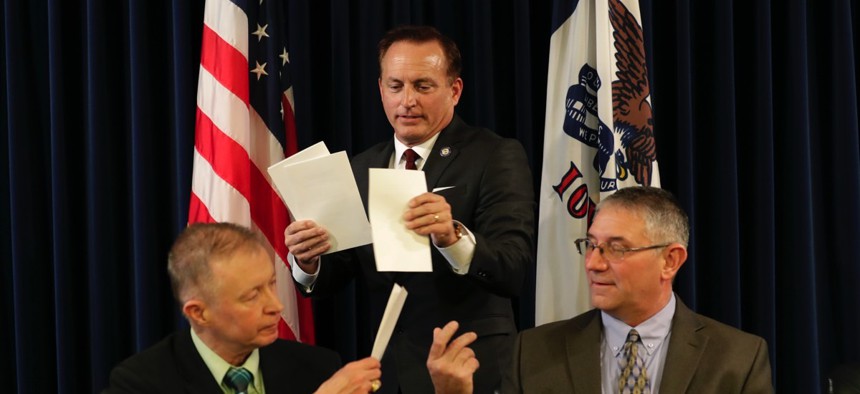States Clear to Send Trump Commission Sensitive Voter File Data

Iowa Sec. of State Paul Pate, center, collects ballots from Iowa electors Alan Braun, of Norwalk, Iowa, left, and Don Kass, of Remsen, Iowa, right, during Iowa's Electoral College vote in 2016. Charlie Neibergall / AP Photo

Connecting state and local government leaders
The ACLU is attempting to document the process.
A federal judge declined on Monday to issue a temporary restraining order blocking the Presidential Advisory Commission on Election Integrity from seeking sensitive voter file data of states.
The Washington, D.C.-based public interest research group suing the commission, Electronic Privacy Information Center, argued in court the mailed requests violated constitutional privacy rights, reported the Los Angeles Times.
Only Arkansas had complied when the commission voluntarily ceased collection on July 10, pending the outcome of the case, though 16 other states are expected to comply fully, according to the Brennan Center for Justice, now that the way is clear.
“The commission cannot evade privacy obligations by playing a shell game with the nation’s voting records,” said EPIC President Marc Rotenberg, following the decision, in a statement.
Twenty-one states refused to provide the commission any information, prompting President Trump to ask, “What are they worried about?” prior to the body’s first livestreamed meeting on July 19.
Two states are reviewing the request, two states never received one and another eight plan to impose conditions prior to the release of the data. Iowa falls into that last category.
Iowa’s Secretary of State Paul Pate provided two emails to the American Civil Liberties Union the same day, the entirety of his correspondence with the commission, in response to an open-records request. The civil rights organization is compiling all communications between the the commission and state elections officials, having sued the body in court on the grounds it violated the Federal Advisory Committee Act by not making all of its records and meetings public.
That suit and others against the commission are ongoing, and Pate, a Republican like the majority of the commission’s members, accused the ACLU of trying to garner media coverage with its tactics.
Names, addresses, dates of birth, party affiliation, and elections voted in are all included with Iowa’s voter list, though Social Security and driver’s license numbers are redacted by law. A record of who citizens vote for isn’t kept.
Trump formed the commission through an executive order after publicly suggesting that voter fraud by non-citizens was to blame for his loss of the popular vote by nearly 3 million ballots to Democrat Hillary Clinton in the November presidential election. The ACLU sees the move as an attempt at voter suppression, with election officials in at least four states reporting the commission is already having a “chilling effect” on registration.
“Instead of these scare tactics, organizations such as the ACLU would better serve voters by helping them understand that their personal information will not be compromised by registering and voting,” Pate wrote, according to the Quad-City Times.
Dave Nyczepir is a News Editor at Government Executive’s Route Fifty and is based in Washington, D.C.

NEXT STORY: Counties Are on the Front Lines of Cyber War





